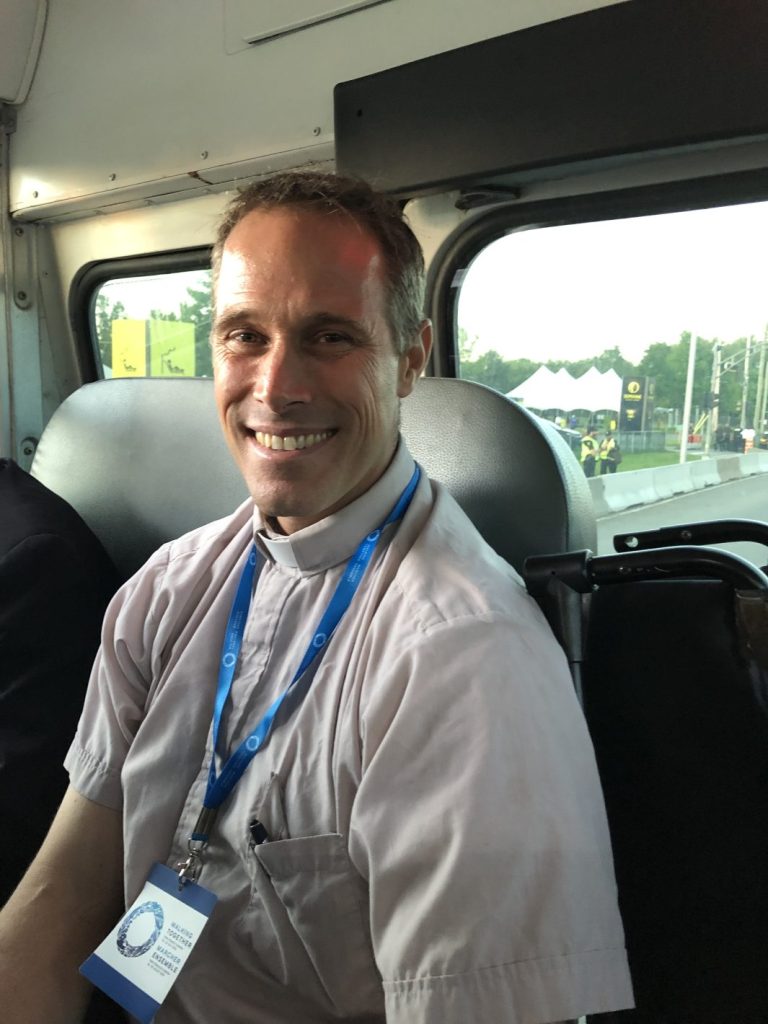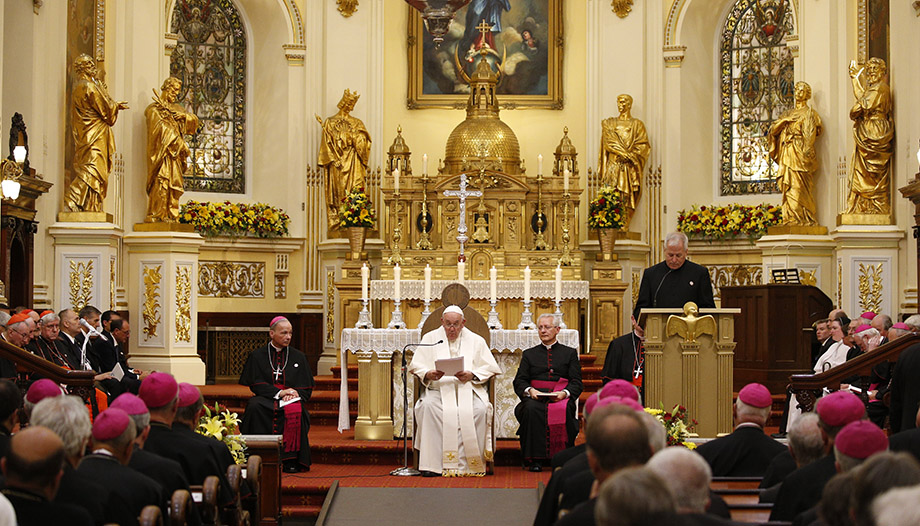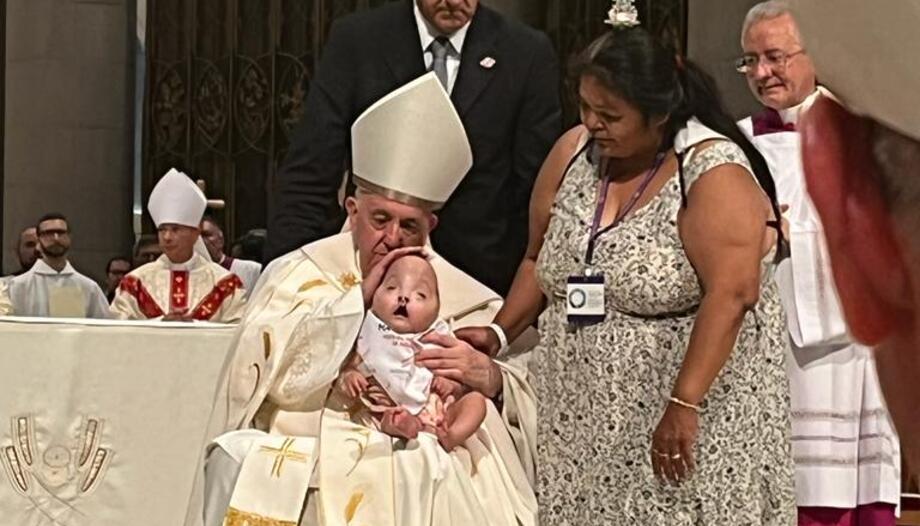Pope Francis continues his visit to Canada, which he himself has called a penitential pilgrimage. In this second stage in the province of Quebec, the Pope held a meeting with Canadian authorities, the celebration of Holy Mass for natives and other pilgrims in a sanctuary in Beaupré, and Vespers with the clergy and pastoral agents. Today he concludes his visit to this mostly French-speaking province and flies to Iqaluit.
Master class on social doctrine
The Pope first listened to Prime Minister Justin Trudeau and then to the Governor General, of Inuit origin, Mary Simon (representative of Queen Elizabeth II and seated to the right of the Pontiff - in the heart of autonomist Quebec).
Francis delivered a master class on the social doctrine of the Church. That was on July 27 at 5 p.m., before Bergoglio plunged with his popemobile into a bath of people - the thousands of enthusiasts who followed him on a giant screen in the historic park of the Plains of Abraham (where in 1759 the English definitively defeated the French). The speech of the head of the Vatican State was given in a protocol atmosphere. It was clear that the Pope had done his homework. He wanted to be inspired by the Canadian symbol par excellence, the maple leaf.
Already "the native peoples extracted sap from the maple trees with which they made nutritious syrups. With their industriousness they were attentive to safeguarding the earth and the environment, faithful to a harmonious vision of creation... which teaches man to love the Creator and to live in symbiosis with other living beings. There is much to learn from their ability to listen to God, to people and to nature. We need it ... in today's whirlwind ... characterized by a constant "speeding up"which hampers a truly human, sustainable and integral development (see Laudato si'18), which ends up generating a "society of weariness and disillusionment" that needs contemplation, the genuine taste of relationships".
"The large maple leaves ... absorb polluted air and restore oxygen, marvel at the beauty of creation and ... the healthy values present in indigenous cultures are an inspiration to us all and can help us heal the harmful habits of exploiting ... creation, relationships, time."
He returned for the umpteenth time to ask for forgiveness, deploring past policies of assimilation and disengagement and deculturation (the neologism is mine). He repeated that "it is tragic when some believers, as happened in that historical period, do not conform to the Gospel but to the conveniences of the world. It was a deplorable system promoted by the government authorities of the time" and not by the Catholic, Anglican and Presbyterian churches (one understands).
In addition to this, the professor of political philosophy made two points. First, that Christians also did a great deal of good. Faith played an essential role in shaping the highest Canadian ideals. Second, that today's authorities may be sinning in the same way. Of course, he said it all very diplomatically, but it is well known that the one who points with the index finger accuses himself with the middle finger, the ring finger and the little finger.
Quoting his beloved Dear AmazoniaThe professor gave a lesson to those present, accusers of the past, on the current ideological colonization. There is "no lack of ideological colonizations today that ... suffocate the natural attachment to the values of peoples, trying to uproot their traditions, their history and their religious ties. It is a mentality that presumes to have overcome 'the dark pages of history'".
For example, in Québec, we often speak about la grande noirceur before 1960. This mentality gave rise to the cancellation culture, that judges the past only in terms of some current categories. Thus a cultural fashion is implanted that standardizes everything and does not tolerate differences, that focuses only on the present moment, on the needs and rights of individuals: it neglects the duties towards the weakest and most fragile: the poor, the migrants, the elderly, the sick, the unborn! Canada is the only country in the world, as far as I know, that does not regulate abortion, that is to say, that admits the law of the jungle on this issue. Not only that, but it prides itself on exporting abortion, and thus colonizes. The Pope insisted that these weak are forgotten by the welfare societies and that "in the general indifference, they are discarded like dry leaves to be burned".
Moreover, just as each leaf of a tree is essential to the rich multicolored foliage of the forest, so too society must not be uniform but open and inclusive. Every family is the fundamental cell of society and the future of humanity is forged in the family. However, it is threatened by all kinds of factors. "May the evil suffered by the indigenous peoples, and of which we are ashamed today, serve as a warning to us today, so that the care and rights of the family are not set aside in the name of eventual productive needs and individual interests."
The maple leaf still gave the pope occasion to dissert on environmentalism (Canada gets a very high mark, he says) and on the folly of war and the need for disarmament (lower mark perhaps): "We do not need to divide the world into friends and enemies, to distance ourselves and arm ourselves to the teeth: it will not be the arms race or deterrence strategies that will bring peace and security." In a tweet, Trudeau said he had spoken yesterday with the Pope and his Secretary of State Pietro Parolin about issues such as Ukraine and food insecurity. Trudeau's Liberal Party government sometimes gives the impression of following the polls. The Pope also referred to this: "Politics cannot remain a prisoner of partisan interests. We must know how to look, as indigenous wisdom teaches, to the seven future generations, not to immediate expediency, to electoral deadlines or to the support of the lobbies. And also to value the desires for fraternity, justice and peace of the younger generations." He recalled that the Catholic Church cares for the most fragile and serves in favor of human life in all its stages, from conception to natural death.
Pilgrimage to Sainte-Anne-de-Beaupré
In 1658 the ship of some Breton sailors sank off the coast of New France, today Quebec. They promised St. Anne that if they were saved they would build her a chapel, which was the origin of the present Basilica, built in the last century. The natives immediately fell in love with the grandmother of Jesus, and this morning the Pope gave her a very long look, like a devoted grandson. As he did so from his wheelchair at the end of the reconciliation Mass, an indigenous woman spontaneously went up to the altar and placed her visibly deformed child in his arms. Iconic moment.
Omnes spoke today with two pilgrims who visited the Basilica for the first time, both traveling from the province of Ontario by car for more than ten hours. Tiffany Taylor, a young social worker of Ojibway origin, went with a dozen indigenous people from a reserve in the city of Sudbury, none of them Catholic. "My language is preserved but I don't speak it. It is now taught in schools, even to non-natives. Near us there was a Catholic boarding school. It hurts me what my tortured ancestors suffered." Seventy % of those attending inside the Basilica were natives. Thousands of others, with free but hard-to-get tickets, congregated outside.

Father Scott Giuliani, SOLT, has been a Canadian missionary in Belize since 2014. He traveled to St. Ann from near Toronto. "In recent years there has been a growing influence in the Caribbean area from wealthy countries pushing to introduce alien values to the people. New definitions of human rights based on a new anthropology, not natural law. Gender ideology and pressure to change local legislation are examples of ideological colonization taking place there. This intrusion of ideas causes much damage to the culture. In Belize, the Canadian government has used part of its foreign aid to export ideological values."

The Pope, in preaching it, pointed out that his homily could be entitled: "From Failure to Hope". He commented on the episode at the end of Luke's Gospel in which two disenchanted disciples of Jesus escape from Jerusalem. He said that Christ resolves our tragedies through his paschal mystery. It is the only way to move forward in situations such as the historical colonization of the indigenous people. Resentment does not heal. We must avoid accusing each other, like Adam and Eve after sinning, or having a sterile discussion, like that of the two walkers. The only way out, for there to be a true reconciliation, is the one that Jesus explains to his two disciples. Christ gives us a way out of the labyrinth of our history. The Eucharist heals. Emmaus shows the temptation to flee - which is escape, not resolution. Jesus came to walk with us.
"There is nothing worse, in the face of life's setbacks, than to flee so as not to face them. It is a temptation of the enemy, who threatens our spiritual journey and the journey of the Church; he wants to make us believe that defeat is definitive, he wants to paralyze us with bitterness and sadness, to convince us that there is nothing to do and that therefore it is not worthwhile to find a way to start over again."
"We too, who share the Eucharist in this Basilica, can reread many events of history. In this same place there were already three temples, but there were also people who did not back down in the face of difficulties, and were able to dream again despite their mistakes and those of others. Thus, when one hundred years ago a fire devastated the sanctuary, they did not let themselves be defeated, building this temple with courage and creativity. And all those who share the Eucharist from the nearby Plains of Abraham (by giant screen), can also perceive the spirit of those who did not allow themselves to be kidnapped by the hatred of war, destruction and pain, but who knew how to project a city and a country anew." It refers to the city of Quebec and the country of Canada, peacefully built since 1759.

Injection of optimism to bishops and priests
Finally today, in Quebec's Notre-Dame Cathedral, the Pope put his finger on the major obstacle to re-evangelizing Canada - and especially Quebec, once a bastion of Catholicism from its explicitly missionary founding in 1608 until the 1960s. Francis delivered a homily during vespers to nearly 100 bishops, many more priests, and others, and spoke to them about secularism. That it is not true that all times past were better.
The Supreme Pontiff recalled that this was the cathedral of the primate see of Canada, whose first bishop, St. François de Laval, opened the Seminary in 1663. He spoke to them about the responsibility of pastoring and evangelizing, which always brings joy. There is no need to be officials of the sacred. He encouraged them to preach a living Jesus in a lively way, to be credible witnesses, to avoid at all costs a very current diabolical temptation: that of negative pessimism. Worldliness is bad but the world is good. He spoke of humility, and in a special way of fraternity.
The first thing is "to make Jesus known. In the spiritual deserts of our time, generated by secularism and indifference, it is necessary to return to the first proclamation." He quoted Montreal philosopher Charles Taylor: secularization is "the opportunity to recompose the spiritual life in new forms and also for new ways of existing."
"In this way," Bergoglio continued, "while the discerning gaze makes us see the difficulties we have in transmitting the joy of faith, it stimulates us to rediscover a new passion for evangelization, to seek new languages."
He concluded as follows. "Please, let us not shut ourselves up in 'retreat', let us go forward with joy! Let us put into practice these words that we addressed to St. François de Laval:
You were the man of sharing, visiting the sick, clothing the poor, fighting for the dignity of native peoples, supporting the weary missionaries, always ready to reach out to those who were worse off than you. How many times your projects were shattered, but always, you put them back on their feet. You had understood that God's work is not made of stone, and that, in this land of discouragement, a builder of hope was needed.
I thank you for all you do and bless you from the bottom of my heart. Please continue to pray for me." A truly emotional ovation followed.









